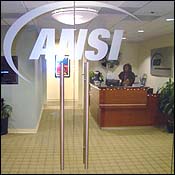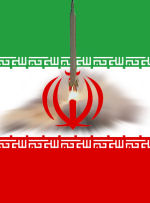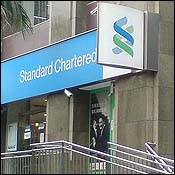
ABOVE: ANSI offices in DC
The Office of Foreign Assets Control (“OFAC”) recently sent a letter of guidance to the American National Standards Institute (“ANSI”) stating that U.S. participation in international standards organizations, such as the ISO and the ITU, did not violate OFAC’s sanctions on Iran even though Iranians also participated in these standards organizations and, often, in the same standard setting processes with U.S. participants. ANSI had filed a request for guidance with OFAC after a number of American companies, particularly those in the oil and gas industry, had expressed concern as to whether they could participate in the international standards process alongside Iranian companies.
OFAC held that the participation in the standards process with Iranians through ANSI and the ISO was both (1) an exempt transfer of informational materials and (2) a permissible elaboration of written materials permitted under the general license set forth in section 560.538 of the Iranian Transaction Regulations (“ITR”). Although the result clearly furthers demonstrable U.S. economic interests in broad adoption of international standards and U.S. participation in the formulation of those standards, this guidance involves, at least with respect to its reliance on the information exception, an unusual interpretation of OFAC’s rules.
The exception for exports of informational materials is limited, under section 560.210(c)(2) of the ITR, to informational materials “fully created and in existence at the date of the transactions.” The problem here, of course, is that the information supplied by U.S. persons may be part of the deliberative process and not fully in existence prior to the U.S. person’s participation in the standards process with the Iranian companies.
The ANSI request for OFAC guidance tries to finesse this problem this way:
Although the ITR require that “informational materials” be fully created and in existence at the time of the transactions, new international standards may be derived from existing national standards . . . or are based on technical information already in existence.
There are enough weasel words in that argument, which I have taken the liberty to emphasize in bold, to see the problem with that argument. The rule doesn’t talk about information that may be based on or derived from information already in existence; it talks about information itself already in existence.
Another effort that ANSI tries to finesse the problem is more direct, although not more logical:
Technical information shared at the working group level is similarly fully created and in existence at the time it is shared within the group
Again, the rule talks about the information in existence at the time of the transaction, not at the time it is shared. By definition, information will always be fully in existence when it is shared or exported. If Iran commissioned me to engage in a market study, it would not be in existence at the time of the commission (which is the time of the transaction under the rule) but would be at the time I exported it to Iran and there is no question that such a transaction would run afoul of the Iran sanctions.
The other rationale urged by ANSI and adopted by OFAC is on much firmer footing. Section 560.538(a)(2) of the ITR permits U.S. persons to participate with non-Governmental Iranian entities in “[c]ollaborating on the creation and enhancement of written publications.” Since the ISO standards are ultimately published (indeed, they would be pointless without publication), this seems to cover U.S. participation in the process with Iranians, including the sharing with, and export to, Iranians information that was not in existence at the time the standards process began. The marketing study example I gave above wouldn’t fit under this exception because it wasn’t intended to be published.
.

 Posted by
Posted by  Category:
Category: 

 Lots of news lately on Iran sanctions, so here’s a summary and some links.
Lots of news lately on Iran sanctions, so here’s a summary and some links. Yesterday, I
Yesterday, I  Here’s a good rule of thumb: Write all emails as if the distribution list included the entire planet because you never know when any given might come back to haunt you. If a certain executive at Standard Chartered had followed that rule, that bank might be worth
Here’s a good rule of thumb: Write all emails as if the distribution list included the entire planet because you never know when any given might come back to haunt you. If a certain executive at Standard Chartered had followed that rule, that bank might be worth 

